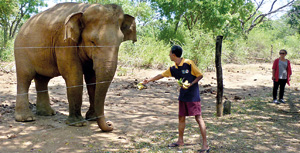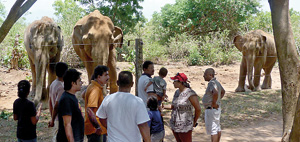Feeding wild elephants and enticing them with homemade bites or fast-food leftovers is encouraging a bad and potentially lethal habit – potentially lethal to the humans who tempt the wild animals, who might the next moment turn on them, and lethal to the animal who will probably have to be put down if it took a human life.
 |
| Local visitors and tourists are unwittingly encouraging a potentially lethal habit when they feed wild elephants. |
This is the life-and-death situation found along the Thanamalwila Road, bordering the Udawalawe National Park, in the south-east.
A few years back, a single jumbo would be seen standing by the electric fence of the Udawalawe park, looking up and down the road for travellers who might stop to give it food. After a while, the jumbo, a familiar sight at the fence, acquired a name, Rambo, and became a great attraction. Rambo was later joined by another elephant that was named Ramba. News was spreading along the jungle grapevine that treats were available at the fence. These days, you will see not one or two elephants but up to 20 or more male jumbos on the inside of the fence, waiting for treats from their two-legged pals.
Some 10 years ago, when the Uda Walawe fence was put up, it was seen as a “model” ecological boundary cum barrier, neatly marking out wildlife from human space. By and large, the fence has been well maintained and manned over the years.
South Asian cultures see the feeding of animals, wild or tame, as meritorious. According to folklore, the first handful from your plate of rice should be put on a leaf or a rock and left out for an animal to eat. The “balu/kaputu dhaane” – food offerings for dogs and crows – are a common feature with many local households.
 |
| The animal and human numbers are rising daily. Photos: Malaka Rodrigo |
The Thanamanwila road is an important route for tourists and pilgrims heading to the south-east. Not everyone who stops to feed the elephants means well. Some tease the animals by showing food and withdrawing the treat. Such behaviour is provocative and only invites attack.
The fence used to be electrified only at night. Last year, the park management decided to switch on the fence during the day as well to discourage jumbo-human interaction.
However, the fence requires regular maintenance and repair, which means the electricity has to be switched off. Villagers also trip the wires in the fence so then can send cattle into the national park to graze. As a result, the electric fence is often not functional during the day. Elephants are smart, and it is only matter of time before they will sense that the fence is “powerless” much of the time during the day.
During a recent visit to Uda Walawe, the Sunday Times observed 12 elephants standing at different spots alongside the fence, waiting for food. We stopped our vehicle where there were three elephants gathered. A boy came up to us to sell sugarcane to feed the elephants. On the other side of the road were wayside stalls selling “Elephant Treats” – bananas, melons, wood-apple and sugarcane. Selling jumbo treats to travellers has become an income earner for many residents in these parts. “It is okay to feed the elephants,” said the lad, when we pointed to the “No Feeding Elephants” signs along the road. Further up the road, a woman was throwing sugarcane at an elephant. She was the owner of a fruit stall and was trying to stall the elephant to help her to do business.
The woman admitted feeding elephants was prohibited and that she and other vendors had been warned by wildlife officers. “This is now our livelihood,” she said.
Driving further on, we discovered a string of wayside boutiques lining the road to Thanamalwila and beyond. These were selling produce, including fruit, vegetables, grain and pots of curd, to the steady stream of pilgrims going towards the sacred precints of Kataragama. We also discovered that the vendors dealing in elephant snacks were selling the pilgrim vendors’ rejects – bruised melons and overripe bananas.
“In the past few months the Uda Walawe fence has been frequently breached,” wildlife biologist Manori Gunawardena told us. She said she was driving along the road one morning, around 7 am, when she saw a wild elephant walking along the main road. “Hearing my car, the elephant ambled up to the fence, kicked over a post, and walked back into the national park,” she said. From the number of posts that have had to be replaced in recent weeks, it is clear that some elephants have learned to break through the fence, and are making a habit of doing so.
The problem of elephants coming up to the fence has led to staff of the Department of Wildlife Conservation (DWC) actively chasing the animals away. In one area, the electric fence has had to be reinforced with a double fence put up a few hundred metres inside. The double fencing, which creates a buffer zone between the road and the elephants, seems to work. But wildlife observers say the aroma of sugarcane, bananas and ripening paddy will continue to lure the elephants.
Udawalawe Park Warden D. M. Weerasinghe confirmed that elephants were regularly breaking down the fence. “They have developed a taste for sugarcane and other food, and are starting to infiltrate farms and cultivated land around the park. Recently an Udawalawe elephant was killed when it fell into a well after a night-time raid,” he said, adding that there were wildlife officers on night duty as well.
Mr. Weerasinghe said there were plans to put up a second fence inside the park to stop elephants from reaching the outer fence, running along the main road. This second fence will be 16 kilometres long and 20 metres from the main fence.
Driving back along the Thanamalwila road, we stopped where a group of foreign tourists had parked their Jeep. “Nowhere in the world do you get a chance to hand-feed a wild jumbo,” said one visitor who was holding out bananas to an elephant. |



